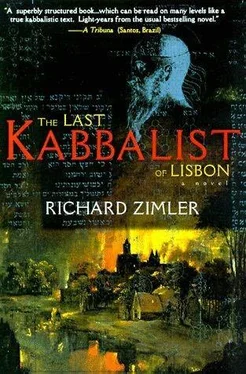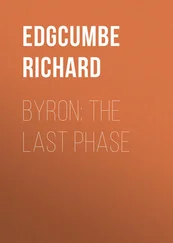Richard Zimler - The Last Kabbalist of Lisbon
Здесь есть возможность читать онлайн «Richard Zimler - The Last Kabbalist of Lisbon» весь текст электронной книги совершенно бесплатно (целиком полную версию без сокращений). В некоторых случаях можно слушать аудио, скачать через торрент в формате fb2 и присутствует краткое содержание. Год выпуска: 1998, Издательство: Arcadia Books, Жанр: roman, Исторический детектив, Философия, на английском языке. Описание произведения, (предисловие) а так же отзывы посетителей доступны на портале библиотеки ЛибКат.
- Название:The Last Kabbalist of Lisbon
- Автор:
- Издательство:Arcadia Books
- Жанр:
- Год:1998
- ISBN:нет данных
- Рейтинг книги:5 / 5. Голосов: 1
-
Избранное:Добавить в избранное
- Отзывы:
-
Ваша оценка:
- 100
- 1
- 2
- 3
- 4
- 5
The Last Kabbalist of Lisbon: краткое содержание, описание и аннотация
Предлагаем к чтению аннотацию, описание, краткое содержание или предисловие (зависит от того, что написал сам автор книги «The Last Kabbalist of Lisbon»). Если вы не нашли необходимую информацию о книге — напишите в комментариях, мы постараемся отыскать её.
The Last Kabbalist of Lisbon — читать онлайн бесплатно полную книгу (весь текст) целиком
Ниже представлен текст книги, разбитый по страницам. Система сохранения места последней прочитанной страницы, позволяет с удобством читать онлайн бесплатно книгу «The Last Kabbalist of Lisbon», без необходимости каждый раз заново искать на чём Вы остановились. Поставьте закладку, и сможете в любой момент перейти на страницу, на которой закончили чтение.
Интервал:
Закладка:
The priest shrugged off the implication and lowered his eyes.
“It won’t be enough to save you if they find out about the sapphire.”
“I need it,” Father Carlos said, a note of sadness in his voice. “Surely you should understand. It’s the last…” His words trailed away. He added dryly, “I should be going now. I’ve a Mass to prepare.”
“You bastard!” Uncle shouted. “Holding back a safira our children will need, that God will need!” When he turned the wall of his back to Carlos, the priest bowed his head as if to request forgiveness from the rest of us and left.
“You could be more understanding,” I said to my uncle. When he waved away my criticism, I added, “So why were you speaking in code with Carlos? There’s no chance Dona Meneses can hear us way back there. Besides, she must know we still practice Judaism. If it bothered her, she’d have reported us to the authorities by now.”
“The priest trusts no one. ‘Even the dead wear masks,’ he says. And the more I learn, the more I think he’s right.” He scratched his scalp and frowned. “I’m going to pay my respects to Dona Meneses.” He shot me a commanding look and marched out.
“How quickly people forget,” Aunt Esther sighed.
“What do you mean?”
She dabbed some rosewater on her neck, then tied a linen kerchief around it. “The plague. It disappears for a couple years and people think it’s something new the Devil’s conjured up.” She brushed a trembling hand over her forehead, reconsidered her words. “Maybe it’s a kind of grace that we can forget. Imagine if…”
“Not a word, not a gesture, not a single lesion do I forget!”
Aunt Esther grimaced; she knew I was referring to my father and elder brother, Mordecai. During the winter of fifty-two sixty-three, a little more than three years ago, the knife of plague had peeled them open to the moist northern winds of Kislev. My father, lost under running black sores and pustules, shivered to death on the sixth day of Hanukkah. A month later, the living skeleton that had been Mordecai was dead in my arms.
My aunt and I sat in silence. After a few minutes, Dona Meneses left our house with the large basket of fruit which she always took away from her visits. Esther said, “I’ll go to see if Cinfa needs help in the store,” then trudged out of the room with that stiff, forward-tilting walk of hers. I watched Judah playing in the doorway with his top until Uncle returned to me and said, “I need your help in the cellar.”
Below the trap door, we descended five coarse granite steps, one for each book of the Torah, to a small landing centered by a menorah in green and yellow mosaic. Passing through the next entranceway, we started down another stairway of twelve thinner limestone steps—one for each of the books of the Prophets. Since the forced closure of our synagogue in the Old Christian year of fourteen ninety-seven, this had become our temple. As we descended, I picked a blue cylindrical skullcap from a shelf and placed it atop my head. Uncle reached back to his shoulders and lifted his prayer shawl over his head, giving it the form of a hood. Together, we chanted, “In the greatness of thy benevolence will I enter thy house.”
The cellar was low-ceilinged, five paces wide, double that in length, floored with the same rough slate as the courtyard. It had witnessed at least a thousand years of chant, and its cool, musty air, guarded hermetically by walls shimmering with knotted patterns of blue and yellow tile, seemed scented with ancient memory. Window eyelets at the top of the northern wall—at the level of our courtyard paving stones—let in only a soft, dim light. From the bottom of the staircase, which flanked the eastern wall of the room, spread our circle of prayer mat. Around its circumference were seven verdant bushes in ceramic pots, one for each day of creation. Three were myrtle, three lavender and one, symbolizing the Sabbath, was an intermingling of both plants. The half of the room beyond the mat, facing sunset, was our realm of earthly work, where Aunt Esther scripted manuscripts and where Uncle and I illuminated them. Our three desks of the finest polished chestnut faced the north wall, were spaced only a foot apart so we could view one another’s work. Each was gifted with its own high-backed chair. Opposite, against the south wall, were two granite bathtubs sunken into the floor. In between was our hulking storage cabinet of coarse-grained oak. It had lion’s-paw feet and possessed eight rows of ten drawers, each of them thin and long, like the receptacles for type in a printer’s studio. A last row, the lowest, had only two drawers. We kept our gold leaf and lapis lazuli in these.
The most unusual item in the room was undoubtedly the circular, platter-size mirror on the wall above the middle desk belonging to Uncle. Inside a chestnut-wood frame, the looking glass’ silver surface was concave, and hence reflected squashed and distorted images. We stared into it oftentimes at the start of meditation as a way of loosening the mind from its accustomed landscape, particularly from its familiarity with the body. The mirror was somewhat famous locally because on the sixth of June of thirteen ninety-one of the Christian era, it was said to have seeped blood at the death of tens of thousands of Jews killed in the riots then raging across Iberia. In fact, great-grandfather Abraham held that it shed an infinitesimal amount of blood—invisible to the naked eye—whenever even a single Jew died. He believed that the blood had become visible at the time of the anti-Jewish riots only because so very many of us had been murdered. From his time forward, therefore, it had been known as O Espelho a Sangrar , the Bleeding Mirror.
We all hoped it would never reveal its talents to us again.
As Uncle motioned me toward the sunken bathtubs, he said, “I need you to pee.”
“Now?” I asked.
From the rim of a tub, he picked up a jug. “In here. It’s spring. I need a virgin’s pee.”
Each year, just prior to Passover, my master made new dyes and colors for our manuscript illuminations. The acid in the urine ate at certain elements to create varying colors, particularly a fine rose when mixed with Brazil wood, alum and ceruse, and a brilliant carmine when mixed with the ashes of vine branches and quicklime.
“I’m no longer a virgin,” I said, picturing Helena as she had been in the hills overlooking the vast monastery being built just west of Lisbon. I’d waited so long for her decision. Until it seemed as if sex and life would not happen to me as they did to other people. And then, when all was lost, when the ship set to take her to Corfu was already anchored in Lisbon, her arms opened to me like the gates of God’s grace.
“A whore at the Maidenhead Inn?” Uncle asked, awakening me from daydream. He had often recommended a certain house of ill repute outside the city walls.
When I answered, “Helena,” he raised his eyebrows like a rogue and said, “In any event, you’re the closest thing to a virgin I can get without revealing that we’re still illuminating Hebrew books. Judah’s too young and I’m too old, and women’s pee is too strong—especially your aunt’s. I tried it years ago when we were married. Turns everything black as Asmodeus’ soul.”
We shared a silly grin. “Now I know why you loaded me with fluids,” I said.
As my water cascaded hot and musty into Uncle’s jars, he shuffled to our desks with the modest, duck-like walk he adopted in synagogues and began to dust them.
After I’d peed in six different ceramic jugs and closed their lids securely, we placed them in the sunken bathtubs. Uncle washed his hands and brushed them through the Sabbath bush of myrtle and lavender. With a puzzled frown, he said, “Diego the printer is so late—I don’t understand.”
Читать дальшеИнтервал:
Закладка:
Похожие книги на «The Last Kabbalist of Lisbon»
Представляем Вашему вниманию похожие книги на «The Last Kabbalist of Lisbon» списком для выбора. Мы отобрали схожую по названию и смыслу литературу в надежде предоставить читателям больше вариантов отыскать новые, интересные, ещё непрочитанные произведения.
Обсуждение, отзывы о книге «The Last Kabbalist of Lisbon» и просто собственные мнения читателей. Оставьте ваши комментарии, напишите, что Вы думаете о произведении, его смысле или главных героях. Укажите что конкретно понравилось, а что нет, и почему Вы так считаете.












